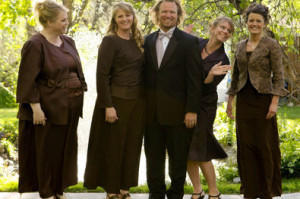 A federal judge ruled last week that a Utah law “forbidding cohabitation with another person violated the 1st and 14th amendments” of the Constitution.
A federal judge ruled last week that a Utah law “forbidding cohabitation with another person violated the 1st and 14th amendments” of the Constitution.
The ruling, which distinguishes between polygamy and bigamy, was the result of a lawsuit filed in 2011 by Kody Brown, star of the reality series ‘Sister Wives,’ now in its fourth season on cable TV’s TLC. Brown has four “wives” — who together have 17 children — but is legally married only to his first, Meri Brown.
(Los Angeles Times, December 17, 2013)
Yet listening to pundits (religious and legal) fulminate about its implications, you’d think this ruling makes it legal for men to marry as many women as their hearts (or other throbbing parts) desire.
Whereas, it merely recognizes the freedom a legally married couple (or even an unmarried couple) has to invite as many consenting adults into the privacy of their home as they wish. And whether it’s to cohabitate or just to comingle for a night is nobody’s business but theirs.
Think about it: committing adultery is not illegal; having a mistress or two or more (even if you call them “sister wives”) is not illegal; cohabitating with one’s mistress(es) is not only not illegal, but arguably quite civilized; and having children out of wedlock is not illegal.
So why was this a federal case? In a word: Mormonism.
Specifically, given the popular and abiding misapprehension that Mormons practice bigamy, to say nothing of polygamy, who can blame Utah – where they comprise 58 percent of the population – for making a federal case out of the lifestyle depicted on Sister Wives.
 After all, this ruling now makes clear (for all the world to see) that Mormons do not practice bigamy or polygamy any more than Christians do.
After all, this ruling now makes clear (for all the world to see) that Mormons do not practice bigamy or polygamy any more than Christians do.
My only issue with Sister Wives is the generally accepted sexism it promotes. I mean, is “Brother Husbands” (i.e., polyandry) really so farfetched these days, when women are increasingly taking on gender roles traditionally played by men?
What’s more, with same-sex marriages being legal now in so many states, well, you get the point.